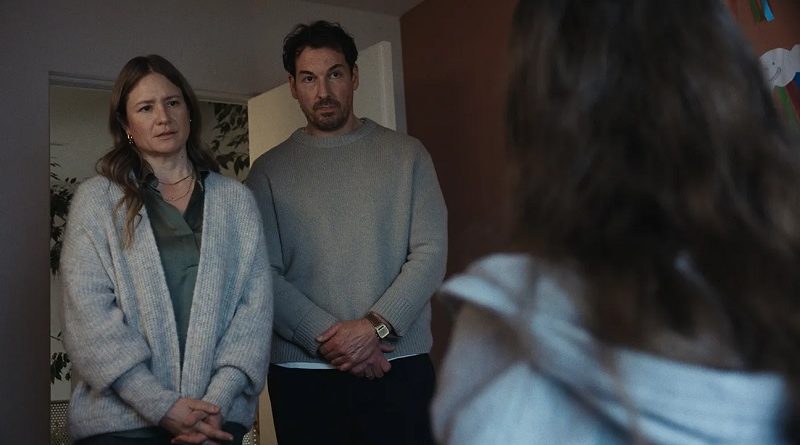Movie Review: What Marielle Knows
Screened at Stockholm International Film Festival 2025
One-liner: An edgy concept and smart writing compels this provocative, thoughtful and well-acted dark comedy drama marriage portrait.
What Marielle Knows is a high-concept comedy-drama centered on parents with a teenager who develops the ability to see and hear everything they are doing. This is a fascinating concept from writer-director Frédéric Hambalek that deals with accountability, leading by example, and the loss of privacy caused by a child’s all-seeing capabilities. It is not so much a comedy as it is a dark drama, with very real consequences playing out within the family as their speculation and doubts are gradually confirmed by Marielle’s extraordinary insights into their lives.
There is no magical quality or “make-a-wish” fantasy here; the film plays it grounded and straight – what you see is what you get. What Marielle Knows starts with a slap that initiates Marielle’s peculiar gift, followed by the initial doubts and growing suspicions of her parents. This supernatural conceit is handled very simply in order to get to the substance of the drama. It opens with racy dialogue in a workplace setting where colleagues are essentially propositioning each other over a smoke break. This provocative opening gambit sets the scene for an often tense and cringe-worthy marriage portrait misadventure.
Once Marielle’s supposed ability is established, every moment involving the parents becomes critical, as their daughter’s judgment and influence lie in the balance. The parents are suddenly on the back foot, trying to parent a child who possesses foresight and knowledge that gives her significant leverage. The political dynamics shift continually as the parents move from disbelief to taking action.
The film stars Julia Jentsch as Julia, Felix Kramer as Tobias and Laeni Geiseler as young Marielle. Jentsch drives “Story A,” navigating tumultuous emotions and risky decision-making. Reined in by her daughter, she is forced to confront her dysfunctional and inert marriage to Tobias. Kramer wields “Story B,” an office comedy where his pent-up frustration and impotence as a creative authority leave him flailing. Marielle is the key to this film, taking up less screen time but remaining critical nonetheless.

“Kids know the darndest things.”
It is a sharp concept that cranks up the tension within the household. The marriage and the partner’s seeming apathy becomes the crux of this escalating drama as lies and secrets breach the surface in difficult conversations. These “open card” discussions lead to even more chaos as the married couple navigate the tricky terrain of having their daughter privy to every waking moment, specifically as they try to curtail a workplace affair. Their behaviors change under the watchful eye of Marielle, while her father’s attempts to vie for creative control and thwart detractors go from bad to worse.
While many children regard their parents as perfect up to a point, this critical handover is amplified by a thought-provoking concept: Marielle sees her parents for who they truly are. The bounds of the premise might have benefited from more thought regarding the mechanics of how she channels these streams of consciousness, and stretching the story does result in a few logistical issues. However, in spite of these minor flaws, the central conceit does enough to establish itself and present powerful themes in a fresh, compelling way – toying with self-image, narratives and our ability to convince ourselves of our own lies.
There is much to appreciate in this entertaining, often taut, and layered fly-on-the-wall drama. At times risqué, this voyeuristic slant plays into the very essence of filmmaking, enabling us to switch between perspectives and sharing the God’s-eye view that Marielle has. Her childlike gaze amplifies the behaviours, morality and hidden lives of her divergent parents.
Through fine performances, the drama remains grounded, offering a unique perspective on family dynamics, workplace politics, and how people respond when they feel like someone is always watching – playing into the “do-as-I-say-not-what-I-do” dynamic. This upside-down approach offers viewers a curious vantage point as the dysfunctional marriage moves from passive to aggressive, forcing honesty and accountability as the truth finds its way out. A remarkable concept with sharp performances, this smart, thoughtful drama is captivating and fairly unpredictable, offering a red-blooded, darkly humorous and at times thrilling ride.
The bottom line: Smart





